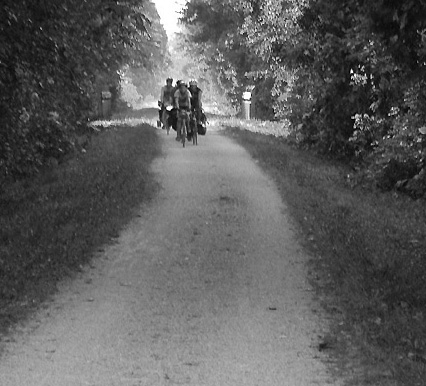I spent the weekend organizing my photo collection I picked up in San Francisco my last trip – reviewing, grouping into categories and then putting the slides/prints/negatives into their special sleeves in photo notebooks. My goal is to digitalize all of the photos in order to preserve them because most modern film types can start to deteriorate over time, especially the negatives. Plus, I want to start building up a digital library – just for fun.
Unfortunately, I have two scanners that I can’t use at the moment: the Polaroid because it stopped working – never again will I buy a Polaroid – and the Nikon, because I don’t have a SCSI device for my laptop that will work with the scanner. However, I was able to scan some prints using my Office Jet, and most of these turned out quite well. For instance the following photo is one I took in the dead of night during one of the worst wind storms in Seattle. All power was off in the city, and I opened the exposure for a considerable length of time, culminating with a flash on some of the trees around our house (the ones still standing, that is). The effect was interesting.

The odd yellow color in the sky is due to a color shift in the film from the over long exposure. I could compensate for the color, but that’s the best thing about the photo. Sometimes, the best results are based on errors, mistakes, and the unexpected. That’s when you keep your mouth shut and take credit for being innovative, rather than being honest and saying, “Well, there wasn’t any TV, and no power for the computer, so I thought I would screw around with some night photography.”
As for the slides, I have an attachment for my Nikon digital camera that allows me to take photos of slides. However, it lacks the quality of a regular scanner, and adds an odd ‘echo’ quality to the photo, is the only way I can think of it. For most of the shots, this didn’t work. However, for some of my slides, the effect actually added to the shot.
For instance, take a look at the following photo of two crows in a dead tree, taken at Canon Beach, Oregon.

I love the photo – surreal and even a little sinister. Shades of Edgar Allan Poe:
But the raven, sitting lonely on that placid bust, spoke only
That one word, as if his soul in that one word he did outpour.
Nothing further then he uttered; not a feather then he fluttered;
Till I scarcely more than muttered, “Other friends have flown before;
On the morrow he will leave me, as my hopes have flown before.”
Then the bird said, “Nevermore.”
From “The Raven”, Edgar Allan Poe
In fact, my site design for the forpoets.org weblogs is inspired by this photo and the other seaside photos I digitalized using the camera attachment. See? The best laid plans are based on mistakes.
Once I get the Wayward Webloggers feedback on the design, and then port it to all the weblogging tools I’m using, then we’ll be ready to rock and roll.
Speaking of forpoets.org and tools, I also spent a considerable amount of time this weekend tweaking weblogging tools. In fact, tweaking, tweaking, and tweaking. And tweaking, tweaking, and more tweaking. Geez, I can’t tell you how tired I am of tweaking at this point in time!
The WordPress and PMachine weblogs installed with no problems. In fact, pMachine installs more easily than Movable Type in my opinion. However, that was the last easy install. We’re into murky waters from this point on.
I tried Nucleus, but it doesn’t work with MySQL 4.x. I also tried PostNuke, and you can see the installation at Weblogging for Poets. Haven’t a clue how to work it and no matter how I tweaked it, I still can’t figure out exactly what it is. I tried a couple of other weblogging tools, none of which had enough to even comment on.
I also installed, removed, and re-installed Blosxom. Since I want support for comments, I’m using the new beta 2.x release of the product, which supports a plugin concept – writeback is a plugin – and all I can say is: tweak, tweak, tweak. This isn’t a weblogging tool to use ‘right out of the box’. There is no box. I’m about ready to throw in the hat, and go begging at Larry’s door for help at this point.
You can see the current state of the installation at RDF for Poets, and no, it’s not working. I’m still trying to figure out how to incorporate writebacks, which are both comments and trackbacks. The documentation can be read using Perldoc on the source, but there’s still a lot of fragments that have to come together – most of them by guesswork. However, I shall persevere. And beg for help.
I thought about using pyBlosxom for the weblogging subsection, but I’m getting tired of the tweaks. So no go with pyBloxsom, and this also includes foregoing the Zope weblogging tools, though I know I’ll disappoint Rev Matt with this one. No, we’ve reached our tweak quota for the week. Seriously.
I’ll most likely either use Movable Type, or a second installation of pMachine for the remainder of the forpoets.org site. Besides – time to get this show on the road. I want to actually do some writing.






